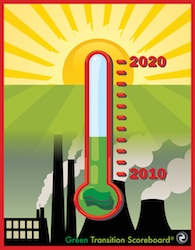According to Ethical Markets’ Green Transition Scorecard, which tracks private investments growing the green economy since 2007, $4.1 trillion was invested or committed by the fourth quarter of 2012. The Green Transition Scoreboard tracks five sectors: Renewable Energy; Green Construction, Energy Efficiency; Corporate R&D and  Cleantech. The report is based on Ethical Markets president Hazel Henderson’s research as a science advisor.
Cleantech. The report is based on Ethical Markets president Hazel Henderson’s research as a science advisor.
“The output of Rio+20 was an unprecedented reintegration of human knowledge, realizing that environmental, social and human capital must be assessed and integrated into financial markets in order to achieve equitable and sustainable forms of development and resulting in new global shared goals and paths toward low-carbon, cleaner, greener, information-richer economies,” said Dr. Henderson.
According to the March 2013 GTS report “Green Transition Inflection Point,” many private investors are following our recommended avenue for institutional investors to shift to green sectors. This transition strategy, which suggests 40 percent of portfolios should be in Green Transition sectors, validates models indicating that investing $1 trillion annually until 2020 can scale innovations and reduce costs. With over $4.1 trillion invested since 2007, investors and countries growing green sectors globally are on track to reach $10 trillion in investments by 2020.
The report omits nuclear, clean coal, carbon capture & sequestration, and biofuels from feedstocks other than sea-grown algae. Fossilized sectors are becoming increasingly stranded assets as low-carbon regulations are implemented and oil, coal and gas reserves become harder to exploit. The report also looks closely at nanotech, genetic engineering, artificial life-forms and 3D printing, determining their green contribution on a case by case basis.

